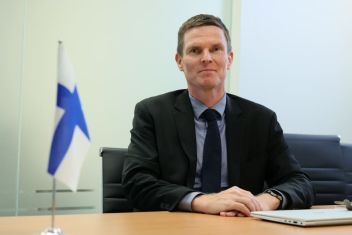
Charles Yen, who believes that “success cannot be copied, but wisdom can be passed on,” hopes to pass along the entrepreneurial experiences of the older generation to the younger generation. (photo by Lin Min-hsuan)
When the Global Entrepreneurship Monitor released its National Entrepreneurship Context Index for 2020, comparing the environment for business startups in 45 economies, Taiwan was ranked third, behind only Indonesia and the Netherlands. In terms of entrepreneurship, two Taiwanese “unicorn” startups, Appier and Gogoro, have attracted particular attention internationally. Appier was floated on the Japanese stock market in March of 2021, while Gogoro has announced plans to list on the US Nasdaq in 2022. Meanwhile, the ghost kitchen food delivery platform Just Kitchen, founded in 2019, has after two short years already been listed on the Canadian Securities Exchange and will soon be launched on stock markets in Germany and the US.
Taiwan has abundant resources for enterprise startups, and the national entrepreneurship brand Startup Island Taiwan is working with cutting-edge domestic startups to connect with foreign markets. There are also more than 60 startup bases providing accelerator services to foreign and domestic firms. Besides investment from the public sector, there has been very active participation by the private sector too. The Taipei Cradle Program of the Asia America Multi-Technology Association (AAMA) offers a platform for entrepreneurs to find mentors to guide them, enabling the younger generation of business founders to learn from previous generations. Meanwhile Anchor Taiwan introduces Taiwan’s advantages to foreign enterprises and startups, and arranges for them to visit Taiwan to network with local businesses and learn about the island’s technology, culture, and way of life.
A comprehensive startup environment
The AAMA was founded in Silicon Valley in 1979 to serve as a platform for exchanges among US-based Asian businesspeople. Charles Yen, one of the founders, returned to Taiwan in 2011 and invited Business Next founder and PChome chairman Jan Hung-tze to work with him to set up the AAMA Taipei Cradle Program, with the aim of enabling the older generation of entrepreneurs to pass their wisdom along to the younger generation through a one-on-one mentoring system.
Ten years on, Yen says: “Taiwan’s startup ecosystem has come a long way. Both policies and legislation are in place to facilitate startup companies, and there are many incubators and accelerators. There is also great diversity among the startups themselves, which span such fields as blockchain technology, the Internet of Things, and artificial intelligence.” The National Development Fund of the Executive Yuan has allotted NT$5 billion to angel investment, of which NT$2.274 billion had been invested as of October 2021, and the Legislative Yuan has amended relevant legislation to improve the legislative environment for startups. In order to attract overseas talent, in 2018 the National Development Council launched the Employment Gold Card scheme, allowing more favorable conditions regarding residency and work permits for foreign professionals wishing to work in Taiwan.
The sharing spirit of Taiwan’s startups
Many accelerators begin guiding startups in the “early stage” of their development, whereas the Taipei Cradle Program aims to help startup companies in the “growth period,” when their products have achieved a certain market share, their initial business operating model is established, and their management team is more or less firmly in place. “Because it takes a long time to break out of this stage, we provide services for two years,” says Yen.
Every year, based on trends in domestic startups, Yen personally invites business leaders from relevant fields to act as mentors. As well as Jan Hung-tze, they have included figures such as Advantech chairman Liu Ke-cheng and former Google Taiwan managing director Chien Lee-feng. With the rise of smart healthcare, former Bureau of National Health Insurance CEO Chang Hong-jen was also brought on board.
In addition to cross-generational learning, the program also emphasizes interactions between mentees, and holds workshops where they can discuss frequently encountered challenges. Besides exchanging ideas on operations and management, mentees can use the opportunity to vent their frustrations about the startup process. Yen stresses that the value of the Taipei Cradle Program lies in “learning, sharing, friendship, and feedback” and not the pursuit of personal gain.

Anchor Taiwan founder Elisa Chiu believes that “innovation” means using new ways of thinking to address existing problems. (photo by Lin Min-hsuan)
The next step
Each year a fixed 40% of the mentees recruited into the Taipei Cradle Program are from businesses in the area of “life services,” while 60% are in “digital technology applications.” “Although startups in the life services category are not going to enter the international market, they have a definite value in terms of domestic social innovation.” Yen says that since the government launched its regional revitalization policy in 2019, startups can be recruited to lend vitality to local economies. For example, recently he has been talking with some enterprises about investing in factories to help the declining fixed-net fishing industry in Hualien.
Tech startups, on the other hand, are limited by the small size of the Taiwan market and have to think about going international. In the Northeast-Asian market, “Japan is taking notice of Taiwan.” Yen says excitedly: “The Japanese government’s Cool Japan Fund has invested in the Taiwan travel startup KKday and in the big data analytics startup Vpon.” This year Vpon went a step further and signed a partnership agreement with Japan’s Ministry of the Environment to use data analysis to target advertisements at potential travelers, to encourage them to visit Japan’s national parks once the Covid-19 pandemic passes.
Introducing Taiwan to the world
Another person who wants to work on behalf of Taiwanese startups is Anchor Taiwan founder and CEO Elisa Chiu. She previously worked in JP Morgan’s Hong Kong operation and at Europe’s biggest credit hedge fund, but eventually came to have doubts about the value of capital markets and quit her job to travel the globe in search of answers. After visiting many countries, she discovered that the thing she most wanted to do was to introduce Taiwan to the world.
After returning to Taiwan, Chiu founded Anchor Taiwan in 2017, in hopes of introducing three aspects of Taiwan to the world: technology, culture, and capital.
In the early days after the founding of Anchor Taiwan, its team took the initiative to contact foreign firms that could become partner enterprises to Taiwanese firms. After getting their interest, they next had to figure out, “What value can Taiwan bring to them?” Foreign groups that want to come to Taiwan have to first get approval from Anchor Taiwan through a written application process, after which there is an interview at which Anchor Taiwan tries to determine whether there is any value in their coming to Taiwan at that point in time. Finally, if their visit is approved, a one-month itinerary is drawn up based on the goals the group has for their visit.
“During their one-month stay, besides visits to firms there are also closed-door meetings to discuss possibilities for future collaboration with Taiwanese companies.” Chiu says that Anchor Taiwan talks with foreign groups every week to understand how they feel about coming to Taiwan for exchanges of views, as well as their outlook on Taiwanese industry, culture, and lifestyles. In the end she has discovered that what impresses them most about Taiwan is its people.
In 2019 Anchor Taiwan hosted a delegation from Estonia. The group included the chairman of the Estonia Health Insurance Fund, the multimedia director of the Estonian subsidiary of the Swedish telecoms group Telium, and both the founder and the CEO of Medicum, Estonia’s largest outpatient care facility. They took a great interest in Taiwan’s telecommunications and health insurance industries, but the most unforgettable experience during their visit came when they talked with the architect Kris Yao. By introducing his works to them, he expressed the yin and yang of architecture and East Asian aesthetic philosophy, winning over these visitors from Europe.
Once during a mountain hiking activity, one delegation member from Canada, the founder of Lagatos, who was not in great shape, lagged behind the rest of the group. One of the Taiwanese participants stayed back with him and chatted as they hiked, and along the way introduced opportunities for cooperation. “Through this process of shared effort they generated a strong rapport, leaving this visitor with a deep impression of Taiwan.”
Taiwan stays open for business
Chiu enjoys photography and is highly skilled at introducing Taiwan through images. Photos are much better at arousing people’s curiosity than dry data. She recalls how when she spoke at a startup forum in Hawaii, she began by showing a photograph of a pineapple. “Taiwan is the country with the most pineapple varieties anywhere in the world, because we are very strong in agricultural technology. An Israeli biotechnology firm specializing in extracting pineapple enzymes has worked with Taiwan to research the use of these enzymes to treat burn injuries. In Taiwan, pineapple peels can also provide fibers to make clothing and paper, which is a demonstration of Taiwan’s capabilities in terms of the circular economy.”
Citing another example, Chiu continues, “Then there’s the ‘Pokemon Grandpa’ who mounted 72 mobile phones on his bicycle.” His image illustrates how Taiwan has a flourishing market for mobile games. Taiwan is usually in the top five countries worldwide in terms of revenues on Google Play, so that many mobile game companies that are just starting out want to first come to Taiwan to learn about the market.
With the arrival of the Covid-19 pandemic, Anchor Taiwan had to cancel all their scheduled visits by foreign groups. They have turned instead to domestic enterprises to try to match up startups with venture capital. They bring the two sides together through online conferences, enabling established companies to expand through startups’ technology, and startups to access venture capital.
Even as industries in other countries have ground to a halt because of the pandemic, Taiwan has continued to operate, and over the past year has performed especially well in the field of startups. Through the continuing efforts of industry, government, and academia, in the future Taiwanese startups will have opportunities to follow in the footsteps of many traditional domestic industries in becoming important players in the global economy.
For more pictures, please click 《Taiwan Startups Go Global—Building an Entrepreneurial Ecosystem》











